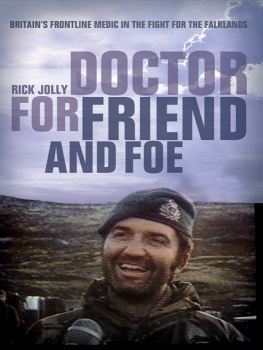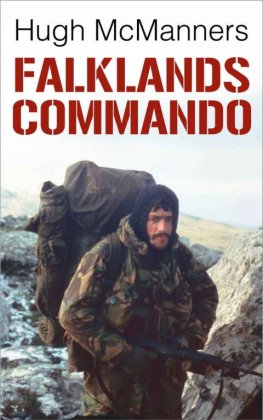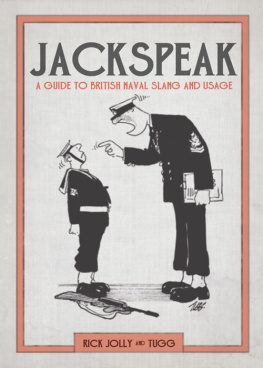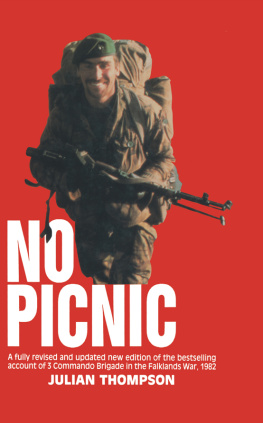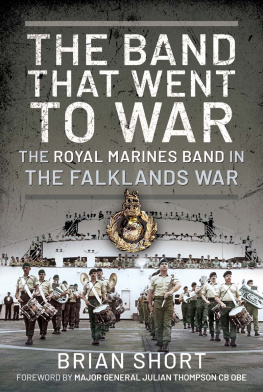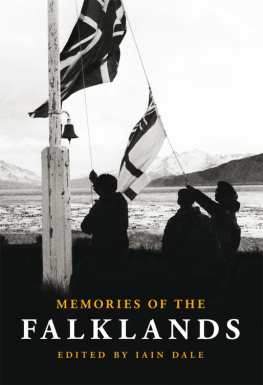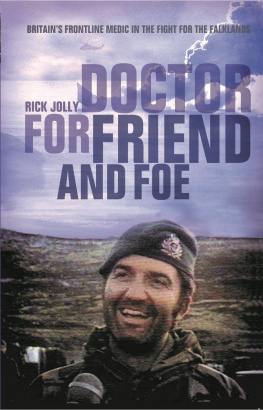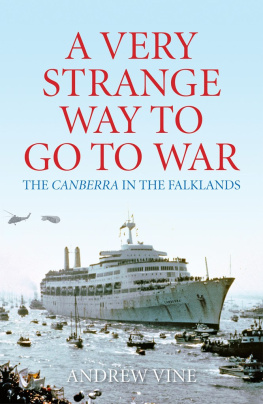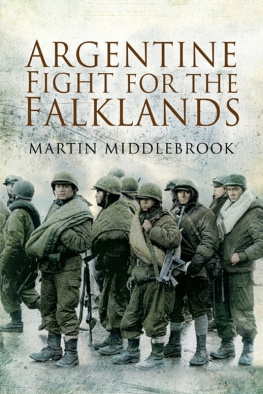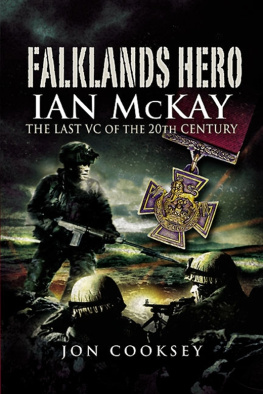For Susie and James
Who, like nearly 30,000 other families in the land sat and watched the Falklands War unfolding, and tried not to think about that knock on the front door.
They also serve
and in happy and proud Memory of those former colleagues from The Red and Green Life Machine who have crossed the bar since 1982:
Jim Pearson
Scouse Davies
Kev Frankland
Neil Blain
Brian Apperley
Bill McGregor
Phred Newbound
Dr Rick Jolly OBE, the author, hereby records his love and thanks to his wife Susie, together with his gratitude for the support and friendship of Mrs Rosalie Dunn, and all the Deltor team, especially Darren McVeigh.
A Conway book
Text Rick Jolly OBE 1983, 2007, 2012
Volume Conway 2012
First published as The Red & Green Life Machine in hardback in the United Kingdom in 1983 by Century Publishing Reissued in paperback by Corgi Books in 1984
Revised edition published by Red&Green Books in paperback in 2007
This new edition published in the United Kingdom in 2012 by Conway,
an imprint of Anova Books Company Ltd.
10 Southcombe Street
London W14 0RA
www.anovabooks.com
www.conwaypublishing.com
First eBook publication 2012
eBook ISBN 9781844861774
All rights reserved. No part of this publication may be reproduced, stored in a retrieval system, or transmitted in any form or by any means electronic, mechanical, photocopying, recording or otherwise, without the prior written permission of the copyright owner.
Rick Jolly OBE has asserted his moral right to be identified as the author of this work in accordance with the Copyright, Designs and Patents Act 1988.
The authors royalties from sales of this book will be donated to Combat Stress, the unique national charity devoted to the treatment and care of British veterans with psychological problems that relate to active service in the Armed Forces of the Crown.
Image credits: All photographs taken by the author, unless specifically acknowledged otherwise. The paintings in the plate sections are by David Hardstaff, courtesy of the authors collection.
THE CONFLICT: 1982
Friday, April 2nd
Just before five in the morning, the bedside telephone rang, and my Falklands campaign began. It took me a little while to come to my senses, because I wasnt supposed to be duty doctor on call. The voice on the line was not that of an anxious patient. Instead, it belonged to Lieutenant Colonel Ivar Hellberg, the Commanding Officer (CO) of the Commando Logistic Regiment, Royal Marines. Incredibly, the rumours of yesterday were not part of some elaborate April Fools Day joke after all. The Argentines really had gone and done it!
Late on Thursday night, the Cabinet were told in London that an Argentine invasion force had landed from the sea and taken over Stanley, the capital of the Falkland Islands. The small outgoing and incoming garrisons of Royal Marines belonging to Naval Party 8901, who were just changing over after a years duty, had put up a good fight, but eventually succumbed to the sheer weight of numbers and heavy weapons ranged against them. Ivar had no information in response to my inevitable question about casualties, but we could be sure that there must have been some Royal Marines wounded, perhaps even killed. He was now summoning me, and all his other Squadron commanders, to a pre-dawn O (Orders) Group. I got up and dressed hurriedly, kissed a sleepy Susie goodbye, and went in to work.
The CO told us that he had already been to the Mount Wise offices of HQ Commando Forces RM. There, hed been informed that a British Task Force was being prepared to sail, with all despatch, down to the South Atlantic. Our normal NATO commitments were to be suspended, because this was very much a private matter. The Sovereign territory of the Falkland Islands had been sequestrated, and the residents of the Islands, through their Governor, had cried out for help
Like all the other units of 3rd Commando Brigade, the Logistic Regiments Easter leave had now been cancelled. Furthermore, Ivar had then been told to activate the standing plans to collect and deliver the many thousand tons of War Maintenance Reserve stores held in various depots around the country. Rations, fuel, artillery ammunition and a range of engineering spares had to be identified and delivered to a series of out-loading ports. This huge effort was going to be even more demanding than usual, because the task had to be completed in 72 hours instead of the more normal planning targets that assumed a lengthy period of tension over several weeks before escalation to actual war.
The COs normally cheery face was now distinctly grim. It was going to be very difficult to meet this time requirement, particularly as British Rail had warned the military of their inability to help. The weekend was approaching, and moreover none of their rolling stock had been pre-positioned as it would have been in time of tension. It seemed that this forcible Argentine seizure had caught everyone, including the Foreign and Commonwealth Office, completely on the hop. The episode had all the makings of a complete and utter shambles, but I was pleased to note both from the signals coming in and the tone of most subsequent telephone conversations, that throughout the Brigade our general reactions were all much the same. There was a quiet anger about this invasion of Sovereign territory, coupled with a palpable and growing determination to redress the grievance of initial defeat.
We simply had to get down there and push the invaders off. Whatever their reasons for taking the unprecedented step of invading a neighbouring country, an independent territory that existed under the protection of the British Crown, the Argentine forces had to be repelled.
I remembered some of the stories that I had been told about the Royal Marine garrison and their long and happy relationship with the Islands. Some of the men who had spent a years tour of duty in Naval Party 8901 had settled there in retirement. The Argies knew just who those men were, and we all wondered if they had been selected, by a cruel and implacable Junta, for an especially hard time. I knew that several of my own Medical Squadron boys had served in the Islands, and that two of them had actually married Falkland Islands girls. Their families were now under the Argentine yoke. This high-handed Argentine coup de main had now become a very personal matter indeed
Our little Regiment was unique in the British Armed Forces. The Royal Marines, with their usual clear thinking, had identified combat logistics as a key feature in the maintenance of fighting efficiency. In our daily lives we are almost unaware of the procurement, delivery and storage procedures for what appears on our supermarket shelves. 3 Commando Brigade could be tasked to be ready to fight in a variety of global locations, with that versatility further complicated by four main climatic conditions hot dry, hot wet, cold dry and cold wet. In 1972 the Corps decided to create a hybrid formation of specialist Army and Royal Marine personnel to cope with the various logistic needs that would result, with every key position within the Commando Logistic Regiment, whether at officer or NCO level, filled by an individual who had earned the green beret.
The Commanding Officers alternated between the Army and Royal Marines, with the Army candidates coming from either the Royal Army Ordnance Corps (RAOC ammunition, explosives, fuel and combat rations), the Royal Corps of Transport (RCT delivery to the front line), the Royal Electrical and Mechanical Engineers (REME repair and maintenance of all equipment) and uniquely, the Royal Navy Medical Service, responsible for combat casualty care.

